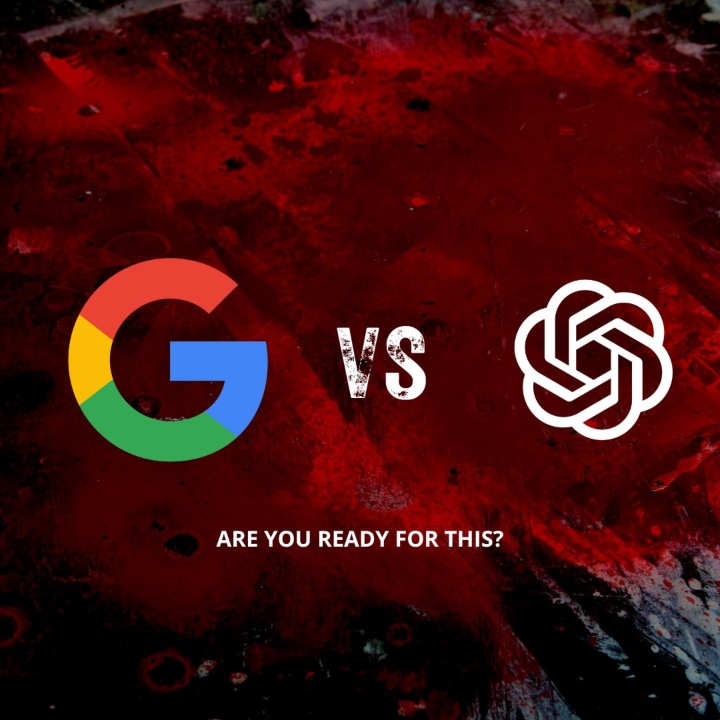A showdown between Google and Microsoft over artificial intelligence (AI) has been elevated by Google’s announcement on Monday, February 6, that it will release a conversational chatbot named Bard.
Microsoft has already invested over $3 billion in OpenAI and is rumored to be willing to invest an additional $10 billion.
Chat GPT quickly gained fame shortly after its release for convincingly imitating human writing.
OpenAI’s ChatGPT has created a stir for its ability to compose essays, poems, or programming code on demand in a matter of seconds. This has sparked debate about cheating or the extinction of entire professions like copywriting and article writing.
With hopes that it will adapt the program to its Office suite and Bing search engine, Microsoft stated last month that it was supporting OpenAI and that it has started integrating ChatGPT features into its Teams platform.
Unprecedented rivalry
The possibility of ChatGPT integration into Bing brought attention to the corporation and rumors that its globally renowned search engine might not survive the onslaught from an AI-powered rival.
In the past few weeks, media reports said Google founders Sergey Brin and Larry Page, who departed the company some years ago, were called back to brainstorm ideas and accelerate a reaction after ChatGPT’s sudden popularity was deemed a “code red” threat.
What’s more, the lackluster profits reported last week by Alphabet, the company that owns Google, which fell short of market forecasts, increased the pressure to act. Google also laid off 12,000 employees as it trains its focus on AI projects.
Noting that Google made its announcement on the eve of Microsoft’s AI-related launch event is a clear indication that the two tech titans will compete for control of the technology, also known as generative AI.
According to independent tech analyst Rob Enderle, “Generative AI is a game changer, and has the potential to disrupt the competitive dynamics for search and information.”
He continued, “Google still largely depends on the fact that their search engine is the most popular; this might change that, consigning them to history.”
✨ Today is a BIG day for AI @ Google✨
Our CEO just unveiled the experimental conversational AI service we’ve been working on. 🚀
Introducing *Bard* ⬇https://t.co/thcDmOiSNH pic.twitter.com/rjlqDKoVag
— Google Europe (@googleeurope) February 6, 2023
Quality responses
Google CEO Sundar Pichai stated in a blog post on Monday, February 6, that Bard conversational AI was going to be tested with the intention of making it more accessible “in the coming weeks.”
The Language Model for Dialogue Applications (LaMDA) technology serves as the foundation for Google’s Bard, which has been under development for a while.
“Bard seeks to combine the breadth of the world’s knowledge with the power, intelligence, and creativity of our large language models,” Pichai said.
“It draws on information from the web to provide fresh, high-quality responses,” he added, hinting that the app would give up-to-date responses, something ChatGPT is currently unable to do.
Incredibly disappointed at Google for this irresponsible, rushed #bard announcement. A slap in the face to all the content creators online. 😡#bardgate – A THREAD pic.twitter.com/6Y6p2PsaBL
— Alexander De Ridder (@adridder) February 6, 2023
Fear of reputational risk
Before the launch of ChatGPT, which was made available in late November, Google had been hesitant to introduce its own language-based AI out of concern about the reputational risk of a premature release.
Researchers and cunning users have shown that systems utilizing language models similar to Bard or ChatGPT can spew out false information or rubbish on a potentially huge scale.
In November, Meta, the owner of Facebook, was compelled to remove the release of its own massive language model called Galactica after three days because users immediately began sharing its biased and inaccurate results on social media.
High standards for quality
Pichai emphasized that Bard’s responses would “reach a high bar for quality, safety, and groundedness in real-world information.”
In order to save computer power and reach a wider audience, Bard would source its responses from a constrained version of its underlying language model, similar to ChatGPT.
Google also said that customers would soon see AI-powered improvements in its search engine, which would set the stage for its impending battle with Microsoft.
Google may be only a year or two away from total disruption. AI will eliminate the Search Engine Result Page, which is where they make most of their money.
Even if they catch up on AI, they can’t fully deploy it without destroying the most valuable part of their business! https://t.co/jtq25LXdkj
— Paul Buchheit (@paultoo) December 1, 2022
Pichai says modern solutions would “distill complex information and multiple perspectives into easy-to-digest formats.”
Generic AI-enhanced search engines will “deliver structured responses to inquiries rather than links,” according to CNRS researcher Thierry Poibeau.
READ ALSO: ChatGPT: Why New AI Chatbot Is Threat to Google
Poibeau also noted that bots like ChatGPT give wrong answers, which is annoying for a search.
Do you have a story you would like us to publish? Please reach us through info@gotta.news






















